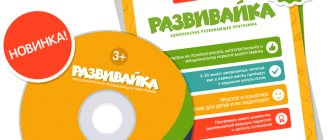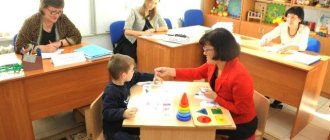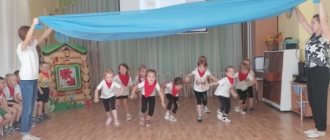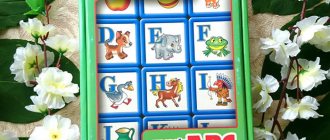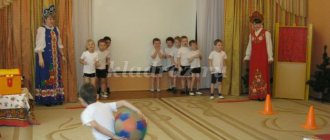Theater games with children
Hello, dear readers, guests, friends. Today I want to introduce you to a very talented mother, professional, actress, director - Yulia Belousova
We play in the theater - why?
And really – why? We don’t have the task of making an artist out of a child, and the vast majority of children are naturally okay with imagination, and they play role-playing games with great success without our adult help.
That's right. But acting training (and we will talk about it, only in a slightly adapted form) is an amazing and unique activity in that you do not get knowledge, skills, information, food for thought and impressions from the outside, from a teacher or from a book, but mostly you draw from yourself. And - equally - from your “colleagues”, if there are any (ideally, acting training is a collective endeavor, but it is quite possible to do it alone with your mother). That is, this is a great way to get to know yourself - different, contrasting, unusual, to realize your creative courage, try to be the director of your own ideas, and, of course, bring them to life here and now.
At what age can you play these games?
From anyone. Such activities can be interesting and useful for both children and adults. If desired, any game or exercise can be adapted for the baby and vice versa - made more difficult and varied, you just need to turn on your imagination. Therefore, the age range of our classes will be approximately as follows: from 2-3 years to infinity. I will deliberately not talk about what exactly develops this or that task - you and I understand perfectly well that any game develops absolutely everything in a child, no matter what is written in the manuals and on the boxes of games and toys.
Let's agree on the shore!
Before you and I set sail from the shore and sail along the theatrical and creative waves, I want to draw your attention to one thing in order to avoid disappointment later. What we are accustomed to consider the theatrical activities of our children - matinees in kindergarten, for example - actually have nothing to do with theater in any of its manifestations and forms. I don’t want to offend anyone: matinees are an excellent, interesting and useful thing in their own way, but... infinitely far from the theater. Therefore, in this article you will not find advice on “how to teach a child to speak in public and not be embarrassed,” “what to do so that the child reads poetry loudly and clearly,” etc. Today we will not “learn roles”, put on makeup and sew costumes. But we will play all sorts of stories, come up with real sketches and even master the basics of pantomime. Well, once everything has been agreed upon, go ahead!
Queen Fantasy and King Imagination
These are our friends and helpers; we can’t live without them. Therefore, a whole block of training will be dedicated to them.
Tell the news
– this is where every lesson begins. And I propose to share with you some of the most interesting and exciting news. Maybe you saw something unusual on your walk? Or were you visiting someone interesting? Did you buy a new car or doll? Or did some funny story happen to you this morning? Or maybe you were impressed by some incomprehensible piercing sound, the plush, so pleasant to the touch upholstery of a chair in a furniture store, the smell of linden blossoms in the park? Anything will do! The mother can push the baby’s thoughts a little and start sharing the news first. The trick here is simple: the child tells his story with pleasure, he sees it with his inner eye, it is interesting to him (otherwise he would not have remembered it). And a miracle happens: he tells it beautifully, contagiously, brightly, emotionally, trying his best to convey to everyone the beauty of his news. This is what we will need to strive for when mastering a “foreign” text, be it a poem or something else. After all, the task is not to remember the words and pronounce them “loudly and with expression,” but to see this story and convey it with pleasure to your viewer and listener.
Transformers
. And now we are all wizards. The game is somewhat similar to “the sea is rough.” I will clap my hands and say what we will turn into, and we all immediately become... a ball, a pencil, a flower, a toothbrush... And now it’s a little more complicated: a white rose bud, a faded chamomile in a vase, sad autumn rain, hot sand on the beach …. And now it’s even more difficult: rainbow, doubt, New Year, the letter “A”, cheerful mood, mother’s smile.
Now tell me, please, is it possible to play rain? No, not show it, but play it (or “play it” – whatever you want)? Of course you can! But you can only play a story, but you need to find out or create it. What does rain do? It's going... Great! What else? It’s pouring like buckets, drizzling... Wonderful! And he can also play on the roofs, like on drums, or draw drops on the asphalt, or play with a passerby, trying to drop a drop right down the collar, or blow bubbles in a puddle, or... And now we already have something to do, and the question is “how to play rain" is simply not worth it! And what kind of rain is it? What is his character? Gait? What's your mood today? Maybe he didn't get enough sleep or is angry with someone? And against whom and for what?... Or vice versa - he is very happy because his grandmother came to see him! By the way, can rain have a grandmother? And if so, what does it look like?... And now our rain becomes alive. And we ended up with a small sketch, almost a performance!
Etude
. Now let's try to play a story that someone else came up with. I suggest turning to A. Usachev’s well-known book “Once upon a time there were hedgehogs.” The choice fell on this work, firstly, because probably almost everyone has read this fairy tale, and secondly, the events of this story are quite detailed, they can easily be looked at through a “magnifying glass” and turned into a full-fledged sketch-story.
The kids love to “paint with broad strokes,” so they are ready to show and tell an entire cartoon or fairy tale in two or three gestures. And that's great! And our task is to direct their attention to little things that are no less interesting and “tasty” than dashing plot twists.
Veronica the Hedgehog fell into a jam jar. This is a whole story! You just need to help the child live it in detail a little. To do this, right during our “performance” we can suggest to the child something that has escaped his attention, we can even come up with little things that were not in the book; the magic word “suddenly” is very important in this “prompting”.
Veronica was eating raspberry jam. The forbidden is important! So, she ate without anyone noticing. Delicious! At first she took the jam with one finger, and then she got carried away and began to eat it with her whole paw. And suddenly... it dripped onto the dress. Upset? No? Well, that’s right – jam is more important. She ate and ate and was full! The belly has become so big and the paws are sticky! Does he still want it or not? And this doesn’t matter anymore: the jam has run out anyway, and the last drop remains on the bottom. Suddenly Veronica realized that she was inside the jar... It's fun: you can press your nose to the glass, you can shout up - and you get a funny echo. How many games can you come up with! Oh-oh-oh... How do we get out now? Jump? No, I can’t reach the neck... Maybe I should climb up? But the paws slip... What if the can is broken? I don't have enough strength. Somehow I already feel uneasy... And I really want to go to my mother... What will Veronica do next? Call for help? Or will he come up with his own way out of this situation?
You need to be as delicate as possible with hints: if the child is good at coming up with options on his own, then you shouldn’t interrupt his thoughts, unless you offer some very unexpected circumstance - let him try to get out. And if the child strives to “jump” straight to the result, then the more detailed the mother’s monologue is, the better.
And here are more ideas for similar sketches from the same book: Veronica stuck to the oil can, Vovka plays football and pierces the ball with needles every time, Veronica peeks into a box of bronze medals, Veronica drinks daddy’s ink instead of compote, etc.
Music, let's be friends!
Without music, perhaps, there is no theater. She is a powerful means of expression, a character, the creator of the atmosphere of the performance and an exponent of the feelings and emotions of the characters. Let's listen to her. It is better if the music is classical, instrumental (without words). It’s good if it’s a small and easy-to-understand piece or a 1.5-2 minute excerpt. I.S. Bach, D. Kabalevsky, S. Prokofiev, P. Tchaikovsky, R. Schumann wrote music for children; in their creative heritage there are many such works that we need: small, bright and expressive, eventful. You can easily choose something interesting just for you and your baby. Here is a small list of musical pieces suitable for such games.
Now let's imagine who this music is about? About how the cat drank milk and sharpened its claws? Great! Can you show me this cat? But I wonder what happened to our cat during this “boom” - but obviously something happened, because the music screamed so loudly?!
The more questions the child is asked, the better. Pay your and your children’s attention to musical accents and all sorts of changes: suddenly the music became quiet, quiet, and now there is a pause - also for good reason, and now the tempo and tonality have changed - why is this? etc.
What is the character of this music? Is she kind or militant, thoughtful or playful? It is not necessary to listen to music while sitting, you can move, there is only one condition: listen to the music where it leads and calls. Or maybe we can draw or sculpt it? Let's try! Or compose a fairy tale (together with your mother, of course), and then play it to music, like a sketch?
Voice acting.
Here's another interesting team game. True, it is not with music, but with sounds. Together we come up with a chain of simple actions. For example, I take a glass of tea from the table, put two lumps of sugar in it, stir it with a spoon and drink it. All this, of course, is not real, but imaginary. Now let's think about what sounds we hear during these actions? Footsteps, the sound of sugar cubes, the clanking of a spoon, the sound of drinking water... Perhaps something else? Now let's find suitable objects around us so that we can make these sounds - the most inappropriate objects at first glance can become excellent helpers. All is ready? Now, if there are more than two players, you need to distribute the sounds among themselves. One of the players performs all the actions with imaginary tea, and everyone else voices this process. The game requires close attention from everyone, because the task is not to catch each other, but, on the contrary, to voice the fragment as accurately as possible!
Living word
How we miss him, as soon as life puts us in a situation of some kind of “show”! The words of a memorized poem awkwardly fall down somewhere, and even try to forget themselves along the way! Horror! And how easily we talk about how we vacationed at sea, about the little kitten who has been living at our house since yesterday, about the holiday on the occasion of our birthday. It’s all true: a word can become alive and expressive, and therefore interesting to the listener, only if it is born as a “picture” inside. That is, first we imagine in our imagination what we are talking about - not the text itself, but a very interesting story! – and then we turn our picture into words. This is the main secret of “speaking” games: the birth of a living word.
A tale about...
Yes about anything! I have a bus ticket in my pocket, let’s write a fairy tale about it. The one in whose hands the ticket is located will begin to speak. At my request, the ticket is passed on, and the story is continued by another narrator. I wonder where the plot will lead by the end of the fairy tale? The passing of the “baton” occurs at the boundary of events: “and suddenly...”, “and one day...”, “and then...”
Say it as if...
Here's another game with words. I will suggest a short but not very easy to pronounce phrase: “too salty soup”, for example. For older children, the phrases will be more intricate and longer, but for kids, on the contrary, they will be simpler, you can even limit yourself to one or two words. The main thing is that it can be quickly and easily remembered. Now say it as if you don’t want to eat this nasty soup, and now as if salty soup is your favorite delicacy, the saltier it is, the better. And now it’s as if you cooked this soup, and now you’re apologizing for the fact that it came out too salty. And now this is not about soup at all - this is an encrypted message, it must be said in secret so that no one else can hear it. And now “too salty soup” is your name. Introduce youreself! And now you are the host of the concert and announce the next number of the program. You can go on for a long time.
"Mother"
What a wonderful word!
We say it very often. And for what reason? Let's remember in what situations we turned to our mother today. In the morning we drew a beautiful picture and invited
my mother to admire it.
And then we saw children walking on the street and began to persuade
their mother to go for a walk.
Then they asked me to help
tie my shoelaces.
And then the phone rang and we called
mom. And on a walk we met a large and scary spider, and out of fear we shouted: “Mom!” And after lunch, my mother lay down to rest, and we really needed to ask her something, so quietly, in a whisper, so as not to wake us up, and very affectionately: “Mom!” That's how many stories have happened today, and how different the same word sounded! Now let's play them like a sketch, like a small performance in which only one word will sound.
Two hands - two sorceresses
Hands are perhaps one of the most expressive means. How often, when telling or explaining something, we involuntarily gesture with our hands, helping our story. Their gestures can sometimes say even more than words.
Fly.
It seems to be flying around us and buzzing. And we have her - once! - and caught him in his fist. Let's hear how she's buzzing there? Now let's look at it, just be careful - it will fly away! We open one finger at a time - one, two, three, four, five - it flew away! Now let’s find it again with our eyes and catch it again, only this time with the other hand.
Glue.
Today we glued (by the way, what kind of craft did we make? Was it a gift or just for ourselves? Did it turn out beautifully?), and there was glue left on the palm. You need to clean it off with each finger of the same hand in turn. Happened? Now on the other palm.
Modeling.
You can sculpt from plasticine, from clay, from dough. Or maybe from your own hand. First you need to stretch your hands and warm them up. And now you can sculpt. Anything! Table, mushroom, boat, house, chair. Now let's blind some creature. It can be the most incredible and fantastic. Ready? How does it move? Can I pet him so he won't bite? What does it eat for breakfast and where does it live? What does he have - antennae or paws? He has friends? And most importantly: what is his name, because a name is destiny in some way?
Pantomime.
This is theater without words, but in this case they are not needed, everything is clear. Let's make an imaginary ball. We sculpt it carefully, it should be very, very round and smooth. Here it is getting bigger and bigger, and now let's make it denser and smaller, for this we need to put in more effort. Oh, it has become heavy and almost touched the ground, and it’s hard to hold it - your hand itself is reaching for the ground. And now he suddenly became light. And now you need to hold him so that he doesn’t fly away, you’ll even have to stand on tiptoe. Let's now release him into the sky, let him fly! And we look at him, and there he is, completely transformed into a dot.
Maybe now we can “blind” a cube and build a whole house from our imaginary bricks? You decide. We can go on forever. For those who want to play such games, I would like to wish them not to get carried away with “roles”, but to look for and notice what is alive and real in everything around them: in themselves and in each other, in their own and others’ reactions and emotions, in words, actions, impressions, in the surrounding world. Although they say that actors “play a role,” acting in this case is a process that is as honest as possible, akin to a child’s game: seriously, to the end, for real. This is the paradox of acting training: while acting, don’t act. Don’t grimace and pretend, but live and feel.
Try to play any of the proposed games with your baby, and your own instinct will definitely tell you the direction where you want to go next.
This concludes our lesson. With great pleasure I will answer any of your questions. Creative success to everyone!
Belousova Yulia
author of the blog “Happy Birthday, Belka!”
PS This article is copyrighted and is entirely intended exclusively for private use; publication and use of it on other sites or forums is possible only with the written consent of the author. Use for commercial purposes is strictly prohibited. All rights reserved.
You might be interested in:
"Umnasia" 9-10 years
Thematic set “Forest School”
Defender of the Fatherland Day
The role of theatrical play in the development of children's speech
Author:
Artamonova Irina Anatolevna,
teacher of the children's educational institution "Kolobok"
Yamalo-Nenets Autonomous Okrug, Noyabrsk city
What is "Theatrical Play"
Dramatic play is creative play. It represents the performance of literary works (fairy tales, stories, dramatizations).
The heroes of literary works become characters, and their adventures and life events, changed by children's imagination, become the plot of the game.
Theatrical play in the development of children's speech:
1) develops artistic taste, creativity, expressiveness of speech;
2) develops stage, singing, and dance creativity;
3) expands the vocabulary of words, speech;
4) develops memory, thinking, imagination;
5) creates a sense of collectivism;
6) introduces children to theatrical art.
Theatrical art is close and understandable to children, because the basis of theater is play. By participating in theatrical games, children get acquainted with the world around them and learn to understand it. Through theatrical games, we develop children’s speech abilities and ensure emotional well-being.
Theatrical and play activities develop the child as a person; he develops those aspects of his psyche on which the success of his relationships with people will subsequently depend.
Theatrical games enrich speech, poetic images begin to enter the child’s active vocabulary and become part of the child’s speech.
In theatrical play, a child reproduces familiar literary plots, and this activates his thinking, trains his memory, artistic and imaginative perception, imagination, and improves speech.
There are many fairy tales in the world,
Sad and funny
And live in the world
We can't live without them.
Going on stage is already a responsibility. Therefore, there is no need to memorize text, roles, poses, and gestures with children. The main thing is to understand the meaning of the fairy tale. And skillfully posed questions encourage children to think and analyze rather complex situations.
Theatrical play is just a step that leads to a higher level of theatrical creativity when young children begin to take part in the creation of theatrical play.
The purpose of theatrical games is not to keep children occupied, but to develop the child’s creative abilities and increase his self-esteem. Theatrical games always delight children and are a constant success among them.
In the presented work, I reveal the interaction of teachers with parents. In March 2013, a festive event dedicated to Mothers' Day was held, where children showed a theatrical performance “The Wolf and the Seven Little Goats in a New Way,” and parents took an active part in the preparation and production of scenery and attributes.
I have been working on this topic recently. The basics of dramatization and acting are reinforced and revealed in music classes, at holidays and entertainment, and in independent theatrical activities.
Favorable conditions have been created for independent theatrical activities of children in the group. There is a corner for theatrical activities. It widely presents:
1) various types of theaters (finger, shadow, tabletop, flannelgraph theater, puppet, walking, glove, plane theater).
2) props for acting out skits and performances (set of dolls, screens, costume elements, masks, game props).
Children's creativity is facilitated by the established contact between teachers and students' parents. We strive to achieve such a relationship when mothers and fathers are not indifferent to the creativity of children, but become active allies and assistants to the teacher in organizing their artistic and speech activities.
Many parents make costumes together with their children, help in voicing the texts of the roles...
All this helps to broaden one’s horizons, enriches one’s inner world, and most importantly, teaches family members mutual understanding and brings them closer together.
Children's vocabulary in everyday life is significantly activated, speech becomes more vivid and emotional.
Thus, theatrical activities allow each child to show their own activity, fully reveal their emotional capabilities, and liberate their movements.
Literature:
“Theatrical games in kindergarten” authors: Petrova T.I., Sergeeva E.L., Petrova E.S., 2001, series: Preschool education and training.
“Theatrical classes in kindergarten” manual for workers of preschool institutions, author: Makhaneva M.D., 2001, series: Preschool education.
Series A No. St. 0001042 date of dispatch 04/23/13 ShPI 62502659111224
We invite teachers of preschool education in the Tyumen region, Yamal-Nenets Autonomous Okrug and Khanty-Mansi Autonomous Okrug-Yugra to publish their teaching materials: - Pedagogical experience, original programs, teaching aids, presentations for classes, electronic games; — Personally developed notes and scenarios of educational activities, projects, master classes (including videos), forms of work with families and teachers.
Why is it profitable to publish with us?
1. “Kindergartens of the Tyumen Region” is an officially registered specialized media outlet at the federal level. 2. The activities of the editorial office are supported by the Department of Education and Science of the Tyumen Region 3. We issue a “Certificate of Publication” in the media. 4. The document has a unique number, is entered in the register, has the original seal of the editorial office of the online publication and signature. 5. “Certificate of publication” in the media is sent to the author in both paper and electronic versions.
Details >>>
Sample “Certificate of publication of author’s methodological material in the media.”pdf
Share
